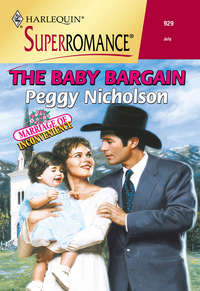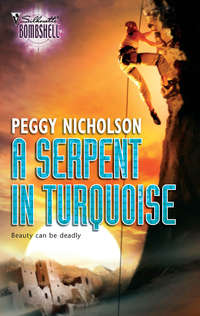
Полная версия
The Wildcatter
Miguel rubbed the smile off his face. Wonderful stories, but not the story he wanted to hear. Not one of those cow-hands would admit to bad water on Kristopherson land.
By midnight he’d been ready to give up in frustration. Badwater. The name could have come from most anything—a dog fell down somebody’s well. Or some early traveler had tapped a new keg on his wagon while passing through here and found his drinking water had gone scummy, so he named the flats to mark the occasion. Maybe it was a corruption of an Indian word and had nothing to do with water at all.
Then another geezer had wandered over to the table where Miguel had sat drinking and swapping yarns. Willy, a Suntop man. Smiling insults had been traded—the Kristopherson crew had apparently bested the Suntop cowboys in a local rodeo a few weeks back.
Fighting hard for his outfit’s honor, Willy had dredged up an ancient triumph. Let the Kristophersons sneer, but Ben Tankersly’s father had beaten old Will Kristopherson decisively in the thirties, and they were still laughing about it. Sam Tankersly had won the Badwater Flats in a game of stud poker. He’d bluffed Kristopherson out of ten square miles with a pair of threes and a pair of jacks, and what do you think of that?
Miguel thought he’d better not kiss the old man, but he was tempted. Instead he’d bought him a round, then teased him, apparently defending his Kristopherson pals. Yes, Sam Tankersly had won the Badwater Flats, old man, but so what? Of what earthly use was a patch of range with bad water?
It was worth plenty, Willy had insisted. Since the creek made the cattle sick, Suntop had drilled wells. Put in windmills to pump up tanks of good, clear water. Nowadays that section was a treasure, with some of the best graze anywhere around Trueheart. It had been rechristened Sweetwater Flats, as the Kristopherson hands well knew. And weren’t they sorry their boss’s granddaddy had been such a blind fool at the card table back in ’34?
Miguel was a lot sorrier than any of the Kristopherson crew, who shrugged amiably and ambled off into the star-filled night shortly thereafter. A bunch of hired hands, what did they care? It was Miguel who’d played his cards wrong, turning down the job at Suntop.
Because one look at the map told him the flats—Badwater, Sweetwater, by whatever name—were remote. Not to be inspected on foot from any public road. He’d need to ride in five miles through Suntop land to reach them. And from what he’d heard around the Lone Star, Suntop’s owner didn’t take kindly to trespassers.
He needed a job on the ranch as his cover.
But haying?
Only as a last—his very last—resort.
HE’D BEEN DRIVING as he replayed last night’s happenings. Following what seemed to be the main private road, though smaller dirt roads branched off to left and right. He’d come more than three miles west across the wide, rolling valley. There was no sign of a house or barn yet; only the neat barbed-wire fences marching along either side of the road. A herd of twenty or so horses grazing on a distant hilltop, miles north. Two tiny cowboys riding a fence line, as far south. Hard to get a grasp on a place this big, and the mountains threw everything out of perspective. That big humped one up ahead might have been two miles distant—or twenty. The jagged peaks to the north, maybe fifty?
It wasn’t just the scale of the place that was making him edgy. This land was too rich, too lush. Green as money. He was used to the red dusty plains of West Texas. Hardscrabble land, where a man had to scratch for his luck—scratch hard and deep. Here luck seemed to be served up on a wide, green plate with a golden rim.
A plate set on some other man’s table, not one where a poor boy from Dos Duraznos, Mexico, would be welcome.
But then, Miguel needed no invitation. No scraps from another’s table. He’d been making his own luck for years.
Still, when he reached the river at last, it was a welcome change. The trees along it rose like a shaggy wall, cutting off the eastern valley from what lay beyond. His truck rumbled out onto a low concrete bridge that spanned dark pools, a yellow leaf drifting fast. With no car in sight, Miguel braked in the middle, to sit staring at the steep bank ahead.
He swung to study the one behind him. As he’d hoped, the valley floor was limestone and shale, not granite. Sedimentary rock. The blood tingled in his fingertips, his palms…the same way all his hunches started—as if he’d scooped up a double handful of luck. He nodded to himself and drove on.
On the west side of the river, the land rose abruptly in a series of wide benches, with the road winding to find the shallowest grade between them. His truck heaved over a rise and Miguel saw the ranch house on a hill ahead, with a clutter of barns and corrals intervening. Nearly there.
But again the road switched back on itself, entering a narrow pass cut in a ledge of rock. Miguel turned to glare at the cut as he drove by—granite, at this elevation—not so promising.
A horn blared out and he jumped violently. He whirled back toward his road, and stood on the brakes. Tires rumbled and skidded on the gravel. The pickup lurched to a halt. Its massive front bumper, with its greasy hydraulic winch, loomed only inches above the hood of the low, sleek convertible that faced it. A red Mercedes-Benz two-seater, top down. The dust his wheels had raised drifted over its glossy wax job, over its windshield, obscuring Miguel’s view of the person or persons within. He blew out a soundless whistle. Now, that would have made a fine first impression—squashing this pretty toy.
His shoulders twitched as the Mercedes’ horn blared again—too soon, too long, much too loud. On a particularly insolent note. Out of my way, peón! it yelled.
Miguel’s back teeth came together with a click. Yes, he should have had his eyes on the road, but then the rich boy that he could now make out behind the Mercedes’ wheel had been coming too fast. They both shared in the blame, but so what? No harm had been done.
Yet, he told himself as the horn blared for the third time. He drummed his fingertips on the wheel and schooled his frown to an expressionless mask. This cut was too narrow for the vehicles to pass each other. Somebody would have to back down.
Since Miguel was the one who needed a job—this scowling princeling with the golden hair clearly needed no job; that car had cost fifty thousand easily—it made sense that Miguel should humble himself and give way. This was somebody of importance. Possibly the ranch owner himself, or the rancher’s son. To offend him…
The horn blared yet again. The driver leaned out his window. “Hey! Get that heap out of my way!” His voice matched his horn—an arrogant tenor, bursting with pride.
Una lástima—a pity—to start out like this. But some things a man could not do. Miguel sighed and reached for the pack that sat on the seat beside him. After unzipping the top compartment, he pulled out an apple. He fished his knife from his jeans pocket, unclasped it and commenced to leisurely peel the fragrant red globe. Turning to prop his back against his door, he focused on his task. With care, it could be done in one continuous spiral—much more satisfying that way.
The horn blared again—a series of impotent, outraged squawks. Miguel pursed his lips and whistled “The Wichita Lineman.” Something his old friend Harry used to sing when he was feeling soulful.
He caught a movement in the corner of his eye and turned to look. The convertible’s passenger door was opening. Someone—a girl—with windblown hair the color of raw copper, of forest fires and wild honey, was getting out. She touched one foot to the ground—but the driver lunged her way, gesturing. He caught her arm, shook his head emphatically.
She hesitated, shrugged…closed her door again.
Her companion put his hand down on the horn and held it there in an ear-splitting, nerve-grating protest. Miguel sighed and cut a wedge of apple, ate it thoughtfully. Looked as if he’d have to go over there and offer to flatten Mr. Mercedes’ nose for him. Not something he wanted to do with a lady present.
On the other hand, maybe it was time she learned her man was not only rude but gutless.
None of your business to teach her, he reminded himself. A rich gringa like that could buy all the lessons in life she needed—or buy her way out of them.
He was saved from choosing. The Mercedes jerked into reverse and roared backward at a reckless speed, its driver taking out his temper on his machine—and his startled passenger, who’d braced herself against the dashboard. What some women put up with. Smiling wryly to himself, Miguel put his truck in gear and followed.
After mounting a final rise, he turned into a wide, dusty barnyard. Several men on horse and afoot gazed off to where the red convertible had reversed all the way to a lone horseman, sitting a big buckskin horse at the far side of the yard. The rider leaned down from his saddle, listened as the driver of the Mercedes gestured wildly—then jabbed his finger at Miguel’s truck.
So that was the man in charge. Not a good beginning, Miguel told himself as he parked alongside a corral and stepped out. But play it as it lays.
“NOPE,” Ben Tankersly drawled, gazing across at the man who’d climbed out of the dusty old pickup. “He’s not one of mine. ’Fraid I can’t fire him for you.” He swallowed his smile and glanced at his daughter. You see what you’ve got here, princess? You want a man who can’t settle his own fights?
Risa’s eyes touched his, then skated away. She stared off into the distance, arms tightly crossed, teeth buried in her lower lip, her cheeks the color of roses. Embarrassed, Tankersly hoped. She damn sure ought to be.
“Fine! Okay! Forget it, then!” Foster stomped on the gas and roared off the way he’d come, raising a cloud of dust.
Moving much too fast for the crowded yard. Ben’s eyes narrowed—the damn fool—then widened as he realized. The car was aimed straight for the stranger, who’d paused halfway across the open space. “You idiot!”
No doubt Foster meant to shame his target, forcing him to scramble for cover. Instead the young man stood, apparently paralyzed. Tankersly sucked in a harsh breath, bracing himself for the impact.
But the stranger took one long graceful stride to the side, whirled—and landed a thumping mule-kick on the driver’s door as the Mercedes shot past.
One of the hands let out a blissful whoop. Tankersly’s pent breath burst out in a guffaw. Stove in his slats for him! Dented his door a good one! The vanquished Mercedes roared out of the yard and off down the hill.
Tankersly’s grin faded. That cowardly fool had his daughter aboard and there he was, trying to sprout wings, running away from his own humiliation. The rancher put the heel of his hand to his heart, rubbed it, then shrugged. Not a thing in the world he could do about it. If Foster didn’t kill her in the next mile or so, maybe Risa would finally see. “That’s not breeding stock,” he muttered, then switched his attention to the oncoming stranger.
He blinked—and felt the dice teeter, then tip over, the way they sometimes did. One final roll and your life turned from empty pockets to can’t lose. Foster was not breeding stock, but this one… Maybe…just maybe… Ben sat and let him come on, sizing him up as he would have any yearling colt, deciding whether to keep or sell him.
And this one looked like a keeper. On his mettle after he’d faced down that attack, his color was high, his eyes direct, fastened on Tankersly. He had that top-stallion strut—good spirits, good body and well-proven pride, combining to give a soft bounce to each stride, though you couldn’t hear his feet hit the ground. With guts, good bone and reflexes. The young man halted beside Ben’s stirrup. “They call me Heydt,” he said, holding out a big brown hand. “Miguel Heydt.”
Something south of the border in his deep voice—just a hint. And in his black Spanish eyes, though his hair was the same bronzy shade as the dark buckskin Ben rode. “Tankersly,” Ben declared himself, squinting down as they shook. Maybe five years older than Risa’s nineteen, he estimated, though Heydt’s eyes made him seem twice her age. Eyes that had seen trouble and sorrow and come through it with just a trace of cool amusement at their corners. Eyes that said, Come what may, I can handle it.
Not like Risa’s pretty boy, whose eyes said, Come what may, I can buy my way free—or talk my way out of it.
Heydt endured another minute of Ben’s appraisal, then he spoke again. “I told him—” he tipped his head toward Joe Wiggly, who was riding up on them “—that I wasn’t interested in haying. I’m looking to cowboy.”
Standing there in a pair of old engineer’s lace-up leather boots! Tankersly snorted. “Not what I need.” If this one didn’t answer to the rein, he wouldn’t do in spite of his looks. Ben had enough trouble this summer without signing on an outlaw. “You’ll buck bales or you can be on your way.”
Heydt nodded impassively, but something was moving at the back of his dark eyes. “When I’m not haying, on my own time can I ride?”
To Ben’s mind, any minute of life not spent in the saddle or in bed with a laughing woman was wasted. Still, his gaze sharpened. With those shoes, Heydt was no cowboy. But neither was he one of those wet-behind-the-ears dreamers who’d yet to find himself—though what kind of fool ever lost himself? Heydt was too old, too toughened, too savvy to be seeking a romantic new career the way some city slickers did every summer, to the locals’ amusement.
So what’s he want? Looking down at those steady eyes in the too-controlled face, Ben knew that asking would get him nowhere. He’d have to wait and see. “Why not,” he agreed with a shrug, though he knew one good reason why not. After a day of haying, even the strongest man nodded asleep at the supper table.
He touched spurs to the buckskin and headed off toward the lower pastures. “Reckon he’ll do,” he told his foreman as he passed him. “Sign him up. And Joe,” he called back over his shoulder, “come evening, if he still wants it, Heydt gets a horse.”
CHAPTER THREE
WHENEVER FEAR or sorrow or confusion nibbled at her courage, Risa Tankersly reached for her camera. Through the lens of her ancient Nikon, somehow the harshness of the world was softened, or at least pushed back to a manageable distance. Framed in the viewfinder, half-perceived patterns became clear. Pain or chaos or uncontrollable events could be frozen into a sixteenth-second snapshot—frozen, reduced to a palm-size glossy rectangle, then tucked away out of sight and mind in one of the manila envelopes where she stored her photos until she felt strong enough to deal with them.
The Nikon had been Risa’s escape hatch from the world since the summer she’d turned thirteen. One of her mother’s last boyfriends, a cameraman with a minor studio, had left it behind when he stormed drunkenly out of their lives one night after a raging exchange with Eva about who should pay the pizza deliveryman. The next morning Risa’s red-eyed and stumbling mother had dumped his camera bag in the trash can along with the rest of his possessions.
When her mother wandered back to bed, Risa had stealthily retrieved it, then hidden it under the T-shirts in her bureau drawer for a month—until Eva’s next lover had come along to erase the last one from mind. Only then had Risa dared to bring out the camera and start—at first timidly, then with growing fascination—to explore the Nikon’s possibilities.
The lovely old Japanese camera, with its scratched case, silken action and merciless, all-seeing lens, had been her best friend and confidant ever since. Had served her faithfully in the wrenching year that followed its coming, when her mother died and a tall, acid-tongued cowboy old enough to be her grandfather stalked into her life, claiming to be her daddy. Whisking her out of the helter-skelter gay and sorrowful world she’d always known, back to his enchanted kingdom called Suntop.
A world where fourteen-year-old Risa didn’t know the players, the rules or even how to mount the standard means of transportation. A world where she’d come too late to ever quite belong.
Five years later, the Nikon was still a comfort and a consolation.
An hour before dawn Risa finally gave up the struggle for sleep. She slipped into her jeans and a green, pearl-snap western shirt, brushed her tousled, flyaway hair, grabbed her camera bag and set out to greet the first rays of the new day on Suntop Mountain.
Better, she told herself, pausing on the terrace to breathe deep the chill pine-scented air. Out from under her father’s roof, she felt better already.
She took the stone steps in two long-legged bounds and strode off down the track. She’d have to hurry to make it to the summit by sunrise.
Passing close under the windows of the guest wing, she glanced upward, half fearfully, half wistfully. If Eric had spent as restless a night as she had… If he now happened to be leaning out his window, contemplating the east, where the sky was already fading from Prussian blue toward a heart-catching turquoise…
But his window was closed against the dawn. Eric wasn’t a lark as she was. Likely he’d sleep till she knocked on his door and coaxed him down to breakfast.
A faint frown drew her dark eyebrows together. He hadn’t been very happy with her when he’d rejoined her on the landing last night. Whatever Ben had said to him after he’d summoned Eric into the library must have stung. Ben had a tongue like a rawhide lash and he didn’t hesitate to use it.
But what was I to do? Ben was a tyrant, used to having his way around Suntop. Certain the rest of the world beyond the ranch’s boundaries would also bend to his rock-bound will. No wonder Eric and her father were clashing–two strong men, from such different worlds…
And Risa caught in the middle, loving them both. She’d spent the night worrying how to do this. How to smooth the way between them. How to make Ben see how wonderful her man really was. Yesterday had been quite a setback.
She blinked, surprised to find that her brooding had carried her as far as the west shoulder of Suntop. And now for the hard part. She gulped in a breath and started up the horse trail that climbed the slope in switchbacks. Hurry! It could only be minutes before sunrise. No point to this exercise if she wasn’t there to greet it.
Robbed of her mountain endurance by nine months at sea level, Risa arrived panting and light-headed on the grassy, rounded summit of Suntop.
Slowly she rotated, glorying in the three-hundred-sixty-degree view, greeting each landmark below in turn, saving the east as she always did for last. Oh, she did love Suntop, and she’d missed it terribly, for all the eagerness with which she’d fled the ranch last September. Someday soon she’d have to bring Eric up here to show him all this.
With that thought she swung east, and she’d timed it perfectly. The first rays of the rising sun swept through the notch in the far-off Trueheart Hills, to strike this enchanted summit, this spot and this alone, with the first light of day—a stroke of gold like a private benediction, a sizzling splash of fairy dust, while all around it the world lay sleeping in purple shadows. Suntop.
“Yes!” Laughing delightedly, Risa spread her arms wide to welcome the sunshine and turned in the light. She should take a picture, but for once she needed no layer of glass between her and the world. it was simply enough to be and be here.
Dizzy with her twirling, laughing softly to herself, Risa stopped, opened her eyes—and found herself staring straight into the eyes of a stranger. The fine hairs shot up along her nape and her breath whooshed out in a startled gasp. She’d spent too many recent months in New Haven, where suddenly encountered strangers could be muggers or worse.
But this is Suntop, she reminded herself, where her father called her and her sisters “Princess.” Here of all places she was safe, if not always happy. She unfisted her hands.
“Cielo,” the man said quietly, and nodded—an oddly courtly gesture.
Spanish. “Yes, it is,” she agreed. “It’s heaven, or ’bout as close as you can get.”
In the light now sifting down the mountaintop, his smile was a slash of white against his tawny skin. Even as she watched, the sun touched his straight, shaggy hair to bronze, his face to ruddy gold.
There was enough light to see his dark eyes, and the amusement in their depths. “That is what it means, isn’t it?”
“Yes, heaven—that’s exactly what it means.” Big hands casually hooked in his back pockets of his jeans, he sauntered uphill to join her.
Risa had an impulse—born from who knows where—to turn and run…run bounding and panting down the far side of Suntop toward the safety of her father’s house.
She stood, eyes narrowed, blood thrumming through her veins, and leaned slightly back on her heels, but still held her ground. Pinned in place by her pride. Then it hit her. “You’re—!”
The cause of all her misery yesterday! The outing to Mesaverde had been utterly spoiled. “You’re the man in the truck!”
“Ah. I thought that might have been you. How many women around here could have hair like a tequila sunrise?” With one last stride he stood before her. “And how’s the car?”
That blasted car. It was Eric’s shiny new toy, a gift from his father on his graduation from Yale Law School last month. After he’d seen the damage, Eric had been in a black rage for most of the morning. “It has a dent in its door. Quite a large one.”
She’d tried at first to hint to Eric that it had been his own fault for driving so close to the man—this man. He’d been outraged that she’d think so, called her disloyal. Whose side was she on?
“But I don’t see it as sides,” she’d protested, retreating immediately from his anger. “I just didn’t think it was worth anyone’s being hurt.” She still didn’t. How silly to argue over right-of-way, like two Rocky Mountain bighorn rams butting heads on a one-goat trail.
“Good. Perhaps that will teach your friend to watch his temper.”
Hardly. After she’d realized how furious Eric was, she’d done her best to back away from their disagreement. In the six months they’d been courting, they’d never had a real lovers’ quarrel. This had seemed such a stupid subject for their first fight—a one-time event caused by a stranger who’d blundered into their charmed circle for a few unpleasant minutes, but now was gone for good.
Or so she’d thought.
“Well, Eric said the whole thing was your fault, actually. He says the uphill car always has right-of-way.” She’d never heard that rule before, but then, Eric knew so many things that she did not. It was one of the reasons he’d first attracted her. He seemed so assured, so at home in the wide, daunting world into which she’d been thrust when she’d gone East to college.
“Oh, well, if Errrric says so…” The corners of the stranger’s mouth curled wickedly as he rolled his r’s. He had a very…arresting mouth for a man, with a beautifully carved, full bottom lip and a certain mobility of expression that was unlike the typical cowboy’s poker face. Or an Ivy Leaguer’s stiff upper lip. And once noticed, that mouth could not be ignored. It drew her eyes like a magnet. She frowned to break its spell.
“And when he tried to run me down?” the stranger continued too politely. “I suppose there, also, it was my fault?”
“He didn’t try to run you down.” Eric had insisted on that, loudly and at length, till finally she gave in and admitted that perhaps only her viewing angle had made the encounter appear so horribly close. “He was headed for the gate—we were on a straight-line course for it—and he…naturally he assumed you’d step aside.” As much as Eric had insisted on that, too, she’d had in the end to believe him. If you loved somebody, you had to believe in him. Trust him.
“That’s what he…assumed?”
He was giving her the lie, just by the tone of his low mocking voice. She hooked her own thumbs in her jeans pockets and tipped her chin up a haughty half inch. “Yes.”








